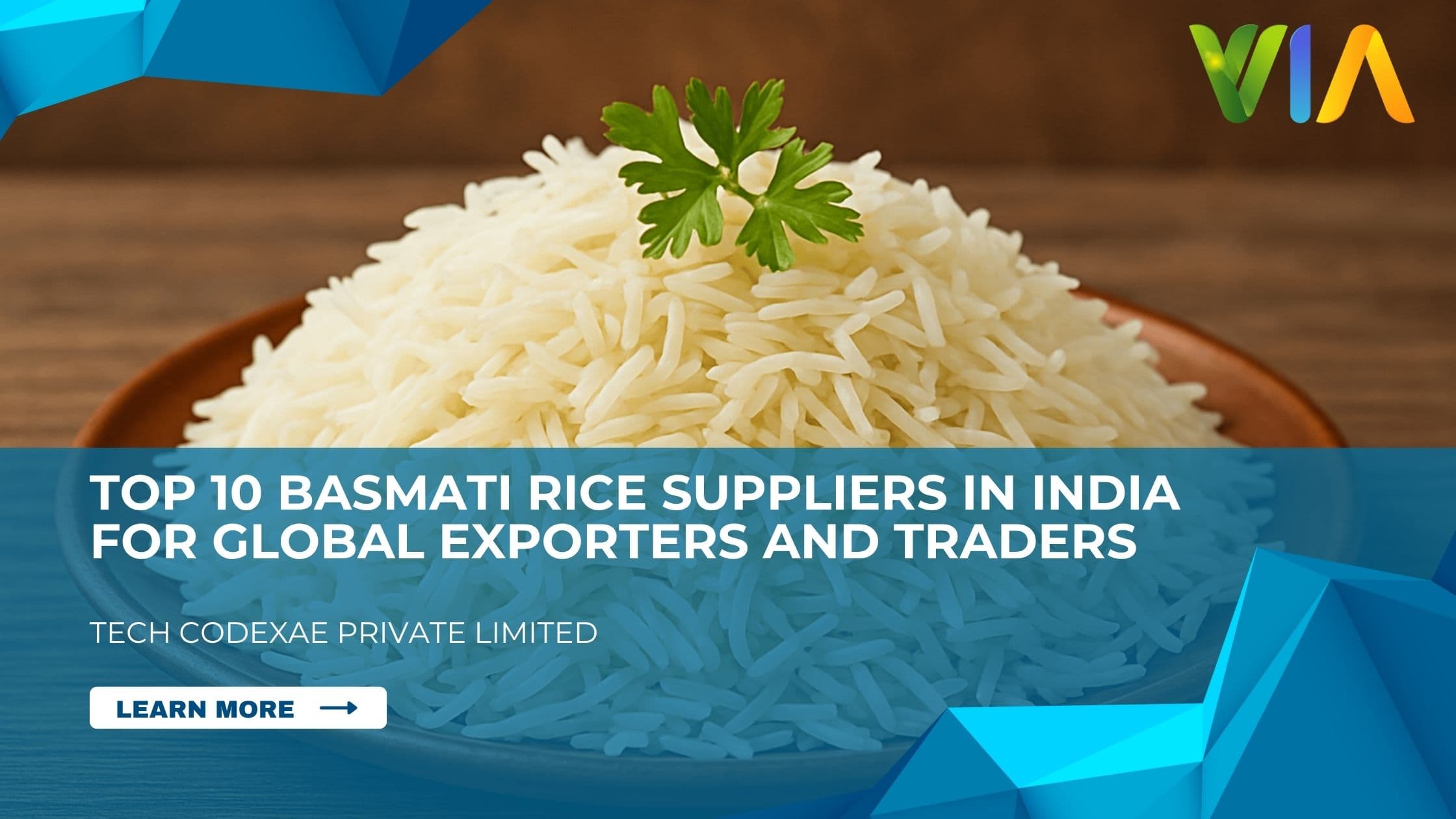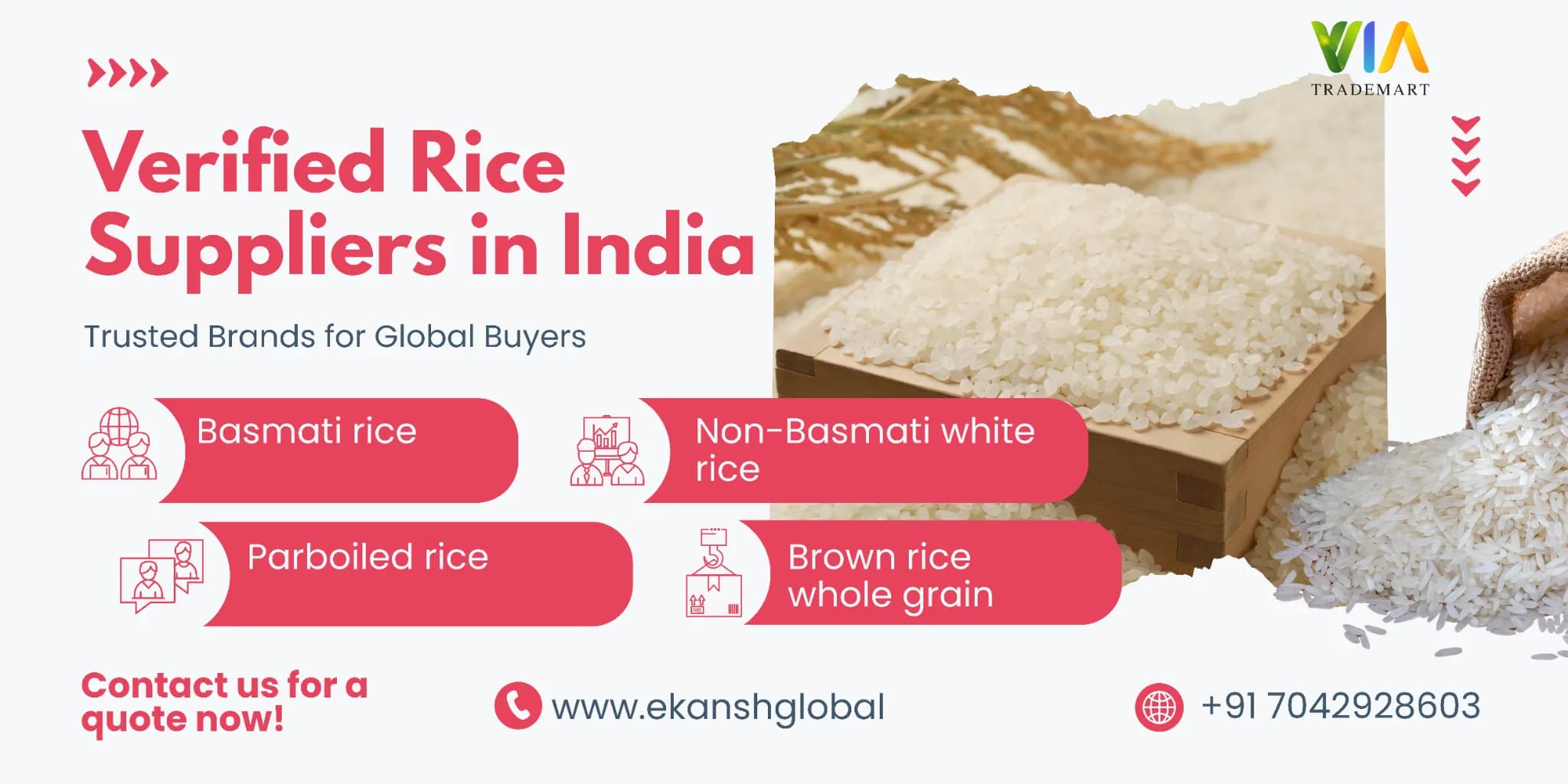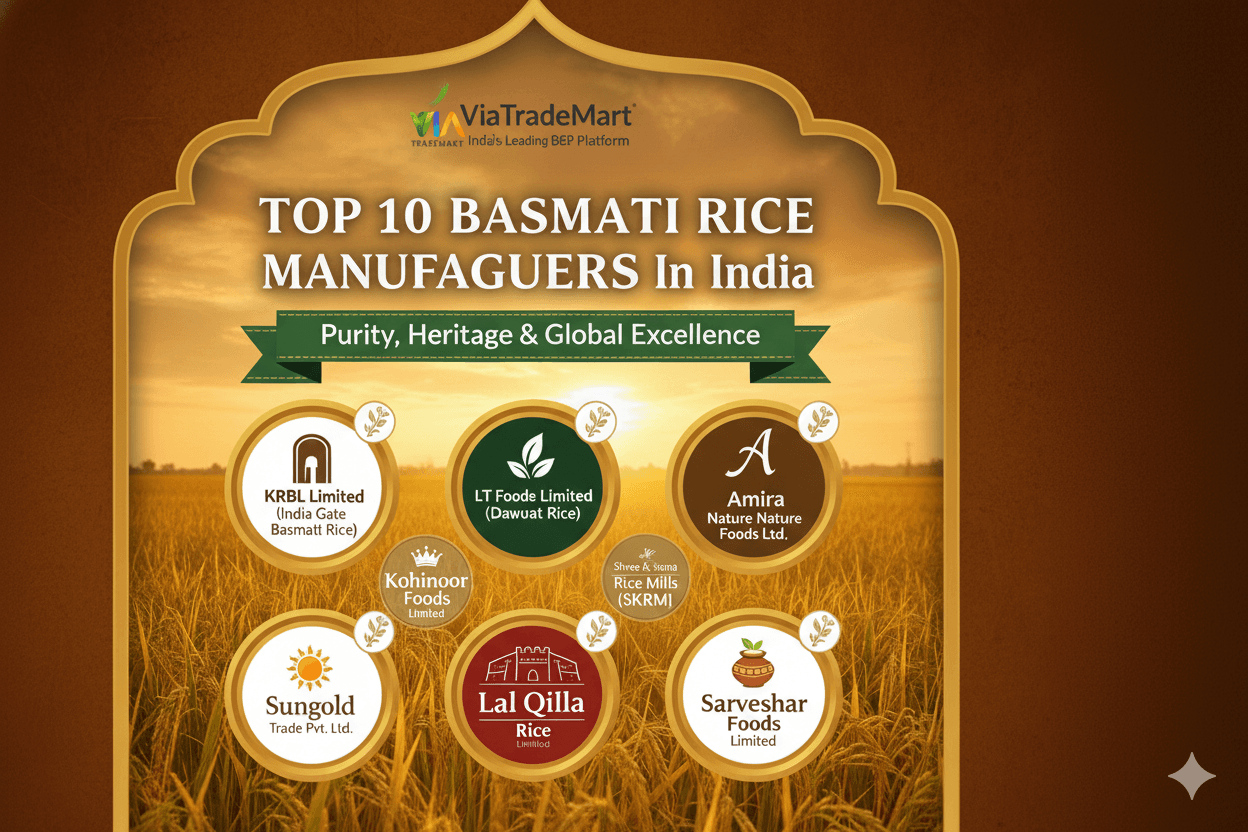Basmati rice is one of India’s most valuable agricultural exports — prized for its aroma, long grains, and cooking quality. For global exporters and traders, building a trusted supplier network in India is essential to secure consistent quality, meet international standards, and protect margins. This detailed guide helps you find the best basmati rice suppliers in India, explains how to vet producers and traders, and highlights the top B2B marketplaces to make sourcing efficient.
Whether you’re a distributor, food importer, wholesaler, or a commodity trader, this article will save you time by surfacing reputable suppliers and giving you practical tips to choose the right partner.
Why sourcing from India matters
India produces the majority of the world’s basmati rice. The favorable terroir in regions such as Punjab, Haryana, and Uttarakhand, combined with decades of expertise, produces grain with a signature fragrance and elongation after cooking. Sourcing directly from India gives buyers access to:
- Authentic aroma and grain quality.
- Competitive pricing through direct exporters.
- Variety options (traditional basmati, 1121, Pusa, Sugandha, etc.).
- Access to organic and specialty lots certified for export.
But the upside comes with responsibility — you must verify quality, certifications (BRC, HACCP, ISO, Organic, FSSAI for domestic compliance), packing standards, and export documentation.
How to evaluate basmati rice suppliers in India
Before we list the top suppliers, here are practical checks every buyer should do:
- Certifications & Lab Reports: Request third-party lab reports for moisture, foreign matter, broken rice percentage, and pesticide residues. Check for relevant certifications (ISO, HACCP, BRC, Organic certification bodies).
- Traceability: Ask for farm-to-fork traceability — supplier should be able to identify origin, season, and processing mill.
- Sample testing: Always receive samples (both raw and packed) and run a small-scale cooking test for aroma and elongation.
- Packing & Shelf life: Confirm packaging materials, inner liners, shelf-life, and storage recommendations for export transit.
- Export experience: Prefer suppliers with track record in your target market (EU, GCC, Africa, US) — they’ll understand documentation, import regulations and incoterms.
- MOQ & Lead time: Negotiate minimum order quantities that fit your business. Understand seasonal lead times.
- Payment & Terms: Use secure payment terms (Letter of Credit, escrow services, verified trade platforms).
- On-site audits / Factory visits: If volume justifies it, plan factory visits or hire local inspection agencies.
These checks reduce risk and establish predictable supply chains.
Top 10 basmati rice suppliers in India for global exporters and traders
Below are ten trusted names and platforms that global buyers frequently consider. (Note: always perform your due diligence before placing orders.)
1. ViaTradeMart — Your sourcing partner for basmati rice suppliers in India
Why choose ViaTradeMart: ViaTradeMart is an online B2B marketplace that connects global buyers to verified basmati rice suppliers in India. The platform specializes in agricultural commodities and provides verified supplier profiles, product listings, and trade assurance features that simplify cross-border transactions.
What it offers:
- Verified supplier listings with documentation and factory details.
- Trade assurance and secure payment options.
- Easy comparison of quotes, packing, and certifications.
- Focused category for basmati rice suppliers in India with filters for variety, grade, and certifications.
For exporters and traders who want a single place to short-list, compare, and initiate orders with confidence, ViaTradeMart offers practicality and time savings. Always confirm lab reports and arrange independent inspection for large shipments.
2. Traditional large exporters and millers
Established exporters and integrated millers in basmati-growing regions remain backbone suppliers for large orders. They typically provide steady volumes, private label packaging and export-grade milling. Look for companies with decades of experience and export footprints in major markets.
3. Regional cooperatives and farmer groups
Cooperatives often supply specialty and organic basmati at competitive prices. They can be ideal for buyers seeking traceability and social-impact stories for their brands.
4. Organic and specialty certified suppliers
Organic basmati commands a premium; specialized exporters focusing on certified organic lots (EU organic, USDA organic) are essential for natural foods retailers and health-focused markets.
5. Commodity traders with procurement networks
Large commodity traders aggregate rice from multiple mills, enabling flexible MOQ and blended lots for large-scale resellers.
6. Private-label packers
If you sell under your brand, private-label packers offer end-to-end services — sourcing, custom packaging, and compliance documentation.
7. E-marketplace verified suppliers (other platforms)
Several B2B websites list verified rice exporters from India — these platforms can be used to source alternate quotes and negotiate better terms. (See marketplace section below.)
8. Specialty exporters for ethnic markets
Suppliers who specialize in specific markets (GCC, UK, US, African nations) understand consumer preferences (grain length, aroma intensity) and regulatory nuances.
9. Mill-direct suppliers
Some exporters sell mill-direct, which can deliver freshest lots and better pricing. Ensure milling hygiene and QA protocols are strong.
10. Trade houses with integrated logistics
Suppliers that bundle logistics, warehousing, and export documentation can significantly reduce operational friction for first-time importers.
Practical checklist for your first order
- Request a commercial sample and evaluate aroma, elongation and parboil behavior.
- Verify lab certificate for pesticide residue and moisture.
- Confirm pack size (5kg, 10kg, 25kg, 50kg) and inner liners.
- Agree on Incoterms (FOB, CIF, CFR) and insurance responsibilities.
- Ask for a proforma invoice and specify brand or private label requirements.
- Use secure payment terms (LC at sight) or platform escrow if available.
- Consider pre-shipment inspection by agencies like SGS, Intertek for large loads.
What is an online B2B marketplace?
An online B2B marketplace is a digital platform where businesses can discover, compare, and transact with suppliers and buyers. Unlike B2C marketplaces, B2B platforms focus on bulk trade, wholesale pricing, trade documentation, and business-grade features such as:
- Supplier verification and KYC checks.
- Trade assurance, escrow services and secure payment methods.
- Catalogues with product specifications and downloadable documents.
- Tools for RFQs (Request for Quotations), multi-supplier comparisons, and bulk-order workflows.
For global trade in commodities like basmati rice, B2B marketplaces streamline sourcing, reduce intermediary friction, and centralize supplier verification.
Which are the best B2B websites for sourcing basmati rice suppliers in India?
Several B2B websites cater to global buyers of agricultural commodities. The right platform depends on your needs (verification, logistics support, or price discovery). Consider these factors when choosing a site:
- Supplier verification: Platforms that vet supplier documents and provide verified badges reduce risk.
- Trade assurance: Escrow or trade insurance enhances payment security.
- Category depth: Sites with a dedicated agricultural category and filtering for basmati varieties save time.
- User reviews & success stories: Real buyer feedback is invaluable.
Popular platforms to explore (use as a starting point):
- ViaTradeMart — focused on verified basmati rice suppliers in India and agricultural commodities.
- Major global B2B portals — wide supplier reach but variable verification.
- Niche agricultural marketplaces — deeper category expertise and quality control.
Each platform has pros and cons. For many buyers, using a combination of a verified niche marketplace (like ViaTradeMart for rice) and a global portal for comparison helps secure best pricing and reliability.
Which is the largest B2B online marketplace in India?
India hosts several large B2B marketplaces. While the “largest” label can be defined by traffic, supplier listings or transaction volume, a few stand out as major hubs for industrial and agricultural trade. These platforms connect thousands of suppliers across categories and provide robust B2B features. However, when sourcing food commodities like basmati rice, niche platforms with focused verification and trade assurance (e.g., ViaTradeMart) can deliver greater confidence than general-purpose mega-marketplaces.
SEO & negotiation tips for buyers
- Keyword optimization for outreach: When searching or posting RFQs, use the exact keyword string basmati rice suppliers in india — most sellers and marketplaces optimize for that exact phrase. Include variety names (e.g., 1121, Pusa) to attract targeted offers.
- Compare unit economics: Check landed cost (product + freight + insurance + duty) — cheapest FOB is not always the best deal.
- Request packing photos & container loading video: These minimize disputes on condition at shipment.
- Lock quality parameters: Spell out moisture content, broken % and head rice yield in contracts.
- Build multi-source strategy: Have at least two approved suppliers to avoid seasonal shortages.
Common mistakes to avoid
- Relying solely on price without verifying quality and documentation.
- Skipping pre-shipment inspection for first-time large orders.
- Overlooking shelf-life and packaging suitability for your market.
- Ignoring compliance for pesticide residues and MRLs (maximum residue limits) of target countries.
Final thoughts — making an informed choice
Finding the right basmati rice suppliers in India requires a blend of market knowledge, careful vetting and using the right digital tools. For global exporters and traders, platforms that combine supplier verification, trade assurance and category expertise save time and reduce risk. ViaTradeMart is positioned as a helpful resource for buyers who want a focused marketplace for basmati rice suppliers in India — it simplifies supplier discovery, showcases documentation, and supports secure transactions.
Before committing to large shipments, always run independent lab tests and consider third-party inspections. A cautious, data-driven approach will help you scale reliably and build long-term supplier relationships.
Call to action: If you’re ready to start sourcing, create an RFQ on ViaTradeMart to compare verified basmati rice suppliers in India, request samples and secure trade assurance — then shortlist suppliers based on lab reports and export experience.
Happy sourcing — may your shipments arrive fragrant, full-grain, and on time.












